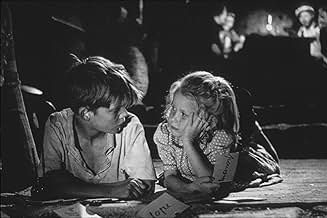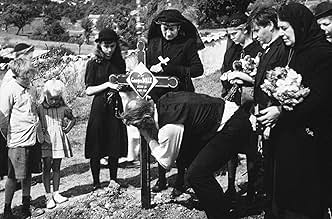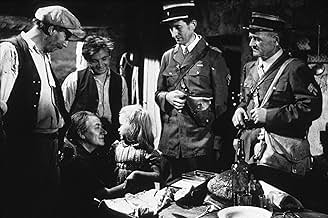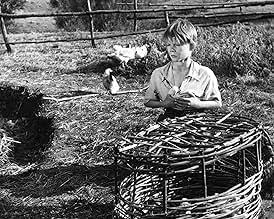IMDb-BEWERTUNG
8,0/10
13.858
IHRE BEWERTUNG
Ein junges französisches Mädchen, das bei einem Luftangriff der Nazis zum Waisenkind geworden ist, ist mit dem Sohn eines armen Bauern befreundet. Gemeinsam versuchen sie sich mit der Realit... Alles lesenEin junges französisches Mädchen, das bei einem Luftangriff der Nazis zum Waisenkind geworden ist, ist mit dem Sohn eines armen Bauern befreundet. Gemeinsam versuchen sie sich mit der Realität des Todes auseinanderzusetzen.Ein junges französisches Mädchen, das bei einem Luftangriff der Nazis zum Waisenkind geworden ist, ist mit dem Sohn eines armen Bauern befreundet. Gemeinsam versuchen sie sich mit der Realität des Todes auseinanderzusetzen.
- Für 1 Oscar nominiert
- 8 Gewinne & 2 Nominierungen insgesamt
Marcel Mérovée
- Raymond Dollé
- (as Pierre Merovée)
Denise Péronne
- Jeanne Gouard
- (as Denise Perronne)
Marie-Pierre Casey
- Infirmière
- (Nicht genannt)
André Enard
- Le premier gendarme
- (Nicht genannt)
Marcelle Feuillade
- La mère de Paulette
- (Nicht genannt)
Roger Fossey
- Le père de Paulette
- (Nicht genannt)
Empfohlene Bewertungen
Never has the world of adults seemed so utterly stupid, brutal and senseless than through the eyes of two innocent children who have to deal with pain, loss, death and war. And yet, the film is gentle, subtle, inobtrusive in its portrayal of the grown-up's follies, and refreshingly unsentimental about presenting the pain and beauty of childhood.
A masterpiece.
Few other titles come to mind in which child actors have so much to bear, and they manage it effortlessly & unforgettably.
[The only thing that bothers me is the too convincing 'acting' of the dead /?/ dog...]
A masterpiece.
Few other titles come to mind in which child actors have so much to bear, and they manage it effortlessly & unforgettably.
[The only thing that bothers me is the too convincing 'acting' of the dead /?/ dog...]
10jonr-3
I don't know why I never managed to see "Les Jeux interdits" until tonight, an August evening in 2003, more than a half-century after the film's release. I'd heard about it ever since I started studying French in college in 1958.
The amount of comedy in the film surprised and pleased me. I'd always had the impression the film was morbid and creepy. I didn't find it so; poignant, occasionally disturbing, even heart-wrenching, but not morbid at all. The acting by the two children playing Michel and Paulette is the most amazing pair of performances I've ever seen. I learned from postings here that the film was made under far less than optimal conditions, but the flaws that do show up in the film, chief among them the abrupt and unsatisfactory ending, are so negligible in contrast to the overwhelming emotional and acting values throughout, that I rated this film a ten, the first time I've reached for the highest number.
I cannot imagine anything finer than this film, whose images will probably haunt me for the rest of my life.
The amount of comedy in the film surprised and pleased me. I'd always had the impression the film was morbid and creepy. I didn't find it so; poignant, occasionally disturbing, even heart-wrenching, but not morbid at all. The acting by the two children playing Michel and Paulette is the most amazing pair of performances I've ever seen. I learned from postings here that the film was made under far less than optimal conditions, but the flaws that do show up in the film, chief among them the abrupt and unsatisfactory ending, are so negligible in contrast to the overwhelming emotional and acting values throughout, that I rated this film a ten, the first time I've reached for the highest number.
I cannot imagine anything finer than this film, whose images will probably haunt me for the rest of my life.
Wonderfully wry, ribald, and ironic look at children, life, and death in the provinces. This must be one of the best examples of poetic realism much better than any Renoir you'll see it's alive and humane, comprising a hundred little iconic cinema moments and several major ones.
A little girl, whose parents are killed in an air-raid at the beginning, wanders into a nearby farm clutching her dead dog and is taken in. She becomes attached to the boy at the farm and they start to expand her dog's grave into a little cemetery of dead animals. There's nothing macabre or sinister about this, nor (as the blurbs maintain) is it particularly a statement about the effect of war on children - it's simply the sort of thing kids might do. When they start pinching crosses from the real cemetery though, they are in for it.
The peasant family are a hoot. The father has a hilarious running feud with his neighbour; the daughter is having an illicit affair with the neighbour's son; the elder son succumbs to a tragi-comic demise after an innocuous accident; the second is a good-natured hick; and the youngest boy gets clouted by his father at every turn ("Take that!", says the father as he smacks him across the head "...and that!" says his sister as she plonks some flowers into his hand). Their every movement is bursting with rough humour and vitality and we are being shown something interesting in every frame. It comes vividly to life, and as an evocation of childhood is up there with Selznick's Tom Sawyer and "Spirit of the Beehive".
Remarkable performances from the two children. There's no sanctimoniousness or even self-awareness to it; Clement got it down and it came out right.
A little girl, whose parents are killed in an air-raid at the beginning, wanders into a nearby farm clutching her dead dog and is taken in. She becomes attached to the boy at the farm and they start to expand her dog's grave into a little cemetery of dead animals. There's nothing macabre or sinister about this, nor (as the blurbs maintain) is it particularly a statement about the effect of war on children - it's simply the sort of thing kids might do. When they start pinching crosses from the real cemetery though, they are in for it.
The peasant family are a hoot. The father has a hilarious running feud with his neighbour; the daughter is having an illicit affair with the neighbour's son; the elder son succumbs to a tragi-comic demise after an innocuous accident; the second is a good-natured hick; and the youngest boy gets clouted by his father at every turn ("Take that!", says the father as he smacks him across the head "...and that!" says his sister as she plonks some flowers into his hand). Their every movement is bursting with rough humour and vitality and we are being shown something interesting in every frame. It comes vividly to life, and as an evocation of childhood is up there with Selznick's Tom Sawyer and "Spirit of the Beehive".
Remarkable performances from the two children. There's no sanctimoniousness or even self-awareness to it; Clement got it down and it came out right.
I am really drawn to art that makes clean choices about messy things in order to deliver the richness of the mess cleanly.
Its a complicated set of tradeoffs, part abstracting things away, part enriching or amplifying things. Cinema is different than any other art because nominally we presume we are seeing reality. The people and things we see are real and the situations seem real.
But what we actually get is refined. There are two pleasures to such projects. One is the inhaling of the world we are presented with, then living with it as it commingles with our blood. The other is a sort of external appreciation of what choices were made, how expertly the arrows were made, and what craft there was in how we were tracked and captured.
This is a wonderful film in both respects and likely will stay with you dually for the rest of your life. Clean and messy.
One of the messes is accidental, as is probably true in most real art. The story is truncated abruptly because funding was. If you didn't know that, you might be amazed at how adroitly this storyteller dropped the narrative to keep us in the story once it has ended. And you might marvel at how appropriate that is, given the girl's own loss of story.
The nominal threads are about losses and the superficialities of religion to cover them. This is wrapped in an evocation of dear childhood, innocence, deep bonds, impulsive large projects. And of course, adults who have no idea of the real world nor appreciation for the bonds to it. We can get all this because the ordinary skills (acting, writing, staging) are performed so well that they get out of the way.
(However, along the way we become aware that the filmmaker murders a finally twitching puppy before our eyes.)
I'd like to highlight the external view, the one that looks as what is refined and what leavened. Simplified in story thread and child's perspective. Enriched in emotion, engagement and unexpected shape. Its sweet and dark both. Its emotionally casual and deeply affecting both. Its both distinctly French and universal, something that is rare in my experience. Bresson can't touch this.
Ted's Evaluation -- 3 of 3: Worth watching.
Its a complicated set of tradeoffs, part abstracting things away, part enriching or amplifying things. Cinema is different than any other art because nominally we presume we are seeing reality. The people and things we see are real and the situations seem real.
But what we actually get is refined. There are two pleasures to such projects. One is the inhaling of the world we are presented with, then living with it as it commingles with our blood. The other is a sort of external appreciation of what choices were made, how expertly the arrows were made, and what craft there was in how we were tracked and captured.
This is a wonderful film in both respects and likely will stay with you dually for the rest of your life. Clean and messy.
One of the messes is accidental, as is probably true in most real art. The story is truncated abruptly because funding was. If you didn't know that, you might be amazed at how adroitly this storyteller dropped the narrative to keep us in the story once it has ended. And you might marvel at how appropriate that is, given the girl's own loss of story.
The nominal threads are about losses and the superficialities of religion to cover them. This is wrapped in an evocation of dear childhood, innocence, deep bonds, impulsive large projects. And of course, adults who have no idea of the real world nor appreciation for the bonds to it. We can get all this because the ordinary skills (acting, writing, staging) are performed so well that they get out of the way.
(However, along the way we become aware that the filmmaker murders a finally twitching puppy before our eyes.)
I'd like to highlight the external view, the one that looks as what is refined and what leavened. Simplified in story thread and child's perspective. Enriched in emotion, engagement and unexpected shape. Its sweet and dark both. Its emotionally casual and deeply affecting both. Its both distinctly French and universal, something that is rare in my experience. Bresson can't touch this.
Ted's Evaluation -- 3 of 3: Worth watching.
A classic French foreign film, one of the best. A necessity for every foreign film lover's video library, along with Cinema Paradiso and Life Is Beautiful. This film haunts you and stays with you long after the film flashes its "finis". Part of this is due to the musical soundtrack, with its romantic guitar melodies, part of it has to do with the sadness of the storyline....the little girl's losing her parents and beloved dog early in the picture, but mostly the film lingers in your heart because of the outstanding performances by the child actors in this film, Georges Poujouly who plays Michel, and especially Brigitte Fossey as Paulette. Her little innocent face expresses all the horrors and trauma of war, what all the millions of children must have felt who were caught up in the barbarism of World War Two, when the security of a loving home was pulled out from under them. Never has the agony of a human being's suffering been so well captured on film, and I think Brigitte was all of six years old when she performed in this movie. A remarkable feat.
Wusstest du schon
- WissenswertesIn a television interview ("Vivement Dimanche Prochain", France 2, 17 April 2005) Brigitte Fossey, who played the little Paulette, revealed that the film had originally been shot as a short, and then it was later decided to extend it into a feature film. Unfortunately she had lost her milk teeth and Georges Poujouly (who plays the boy Michel) had had his hair cut to play in Wir sind alle Mörder (1952). So, in many scenes of the movie Paulette has false teeth and Michel is wearing a wig.
- PatzerThe poor parents are killed by a Focke-Wulf 190. This kind of plane didn't exist at the moment of the "battle of France" in May and June 1940.
- Crazy CreditsThere are two alternate opening credits:The main credit starts with a story book and a female hand opens the book to reveal the credits. The alternate still has the same book but this time we are introduced to the two main characters who are sitting by a lake. In this version, Michel's hand is turning the page and in between the scenes he tells Paulette that he's going to tell a story.
- VerbindungenFeatured in Le ciné-club de Radio-Canada: Film présenté: Jeux interdits (1959)
Top-Auswahl
Melde dich zum Bewerten an und greife auf die Watchlist für personalisierte Empfehlungen zu.
- How long is Forbidden Games?Powered by Alexa
Details
- Erscheinungsdatum
- Herkunftsland
- Offizieller Standort
- Sprache
- Auch bekannt als
- Forbidden Games
- Drehorte
- Produktionsfirmen
- Weitere beteiligte Unternehmen bei IMDbPro anzeigen
Box Office
- Bruttoertrag in den USA und Kanada
- 33.284 $
- Eröffnungswochenende in den USA und in Kanada
- 4.316 $
- 26. Apr. 2015
- Weltweiter Bruttoertrag
- 33.897 $
- Laufzeit
- 1 Std. 26 Min.(86 min)
- Farbe
- Seitenverhältnis
- 1.37 : 1
Zu dieser Seite beitragen
Bearbeitung vorschlagen oder fehlenden Inhalt hinzufügen





























